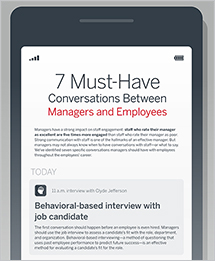Auto logout in seconds.
Continue LogoutEditor's note: This popular story from the Daily Briefing's archives was republished on Mar. 6, 2020.
The news that an employee didn't get a promotion is "hard to hear, and it's hard to deliver," but if you deliver it correctly, you can soften the blow and potentially even strengthen your relationship with your employee, Rebecca Knight writes for Harvard Business Review.
Your one-stop shop for reducing early turnover
The best way to break the news
The news that an employee didn't get a promotion is "hard to hear, and it's hard to deliver," said Joseph Weintraub, coauthor of "The Coaching Manager: Developing Top Talent in Business" and a professor at Babson College.
Heidi Grant, author of "No One Understands You and What to Do About It," added that it's a "conversation that many managers have a tendency to want to avoid" out of worry that "the other person will feel anxious, dejected, and frustrated."
It helps to have a game plan for the conversation. Here are six steps to making the difficult conversation as productive as possible:
1. Prepare, but don't procrastinate. "Don't wing it," said Grant. Make sure you "plan out what you want to say and how you want to say it." Grant advises writing your thoughts down and even practicing delivering the news out loud. Still, it's important notto take too long preparing, according to Weintraub. "You don't want an employee to find out they didn't get the promotion via someone else's Facebook announcement," he said.
2. Be transparent. Grant said that it's important to explain to the employee "how the decision was made" by giving as much information as possible. "We assume that other people understand our thoughts and intentions, but that is almost universally untrue," she said. If you explain the process to your employee, at the very least "it creates a sense of procedural justice," said Grant.
3. Be empathetic. It's important to take steps to protect your employee's self-esteem. Weintraub recommends saying something like, "We only considered qualified, competent candidates. We only have one position open, and someone else got it. I want to thank you for applying and going through the process. I also want you to know that you are a valued and important part of this organization."
4. Don't turn the conversation into a performance review. Even if your employee asks you why they didn't get the job, Weintraub says it's best to "avoid giving the person negative feedback about shortcomings or deficiencies—particularly feedback they've never heard before." Rather, tell them that you'd be willing to talk about it later, and set up an appointment to do so.
5. Resist the urge to promise future promotions. Weintraub says it's tempting to tell your employee, "Next time, you'll get the job," to ease your own discomfort, but that can backfire. If another promotion opportunity comes along and you're forced to pass over the same employee again, "that will really leave (the employee) disgruntled," said Weintraub. Grant agreed: "It's human to want to make it up to the person, but you must resist that impulse," she said.
6. Remember to follow up. According to Weintraub, your employee's initial reaction to the news may not be their only, or their most honest, reaction. "Oftentimes when you get bad news—particularly if it's unexpected—you're not able to process it in the moment," he said. "It may only be later that this person tells a friend or significant other that they didn’t get the job and feel upset." Because your employee's reaction may evolve over time, it's important to check in later, both to emphasize the employee's value and to give "developmental feedback, help, and guidance," said Grant. "Talk about ways for this person to grow, and keep the 'focus on the future'" (Knight, Harvard Business Review, 1/24).
Next, here are 4 ways to be a less-stressed leader
Stress is endemic in today’s health care workforce, but the good news is that leaders have much more control over their stress levels at work than they might think. The most effective leaders take steps to proactively keep their own stress in check—while modeling healthy habits for their teams.
Use this infographic to review effective stress management strategies that can help you become a less-stressed leader.
Don't miss out on the latest Advisory Board insights
Create your free account to access 1 resource, including the latest research and webinars.
Want access without creating an account?
You have 1 free members-only resource remaining this month.
1 free members-only resources remaining
1 free members-only resources remaining
You've reached your limit of free insights
Become a member to access all of Advisory Board's resources, events, and experts
Never miss out on the latest innovative health care content tailored to you.
Benefits include:
You've reached your limit of free insights
Become a member to access all of Advisory Board's resources, events, and experts
Never miss out on the latest innovative health care content tailored to you.
Benefits include:
This content is available through your Curated Research partnership with Advisory Board. Click on ‘view this resource’ to read the full piece
Email ask@advisory.com to learn more
Click on ‘Become a Member’ to learn about the benefits of a Full-Access partnership with Advisory Board
Never miss out on the latest innovative health care content tailored to you.
Benefits Include:
This is for members only. Learn more.
Click on ‘Become a Member’ to learn about the benefits of a Full-Access partnership with Advisory Board
Never miss out on the latest innovative health care content tailored to you.


